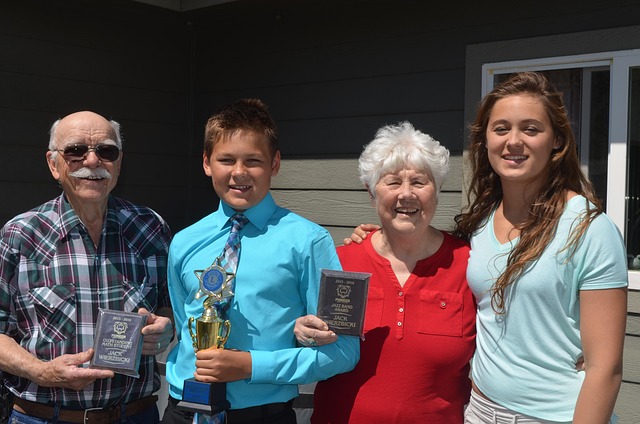In Oregon, grandparents have specific legal rights and access to a robust network of legal assistance for grandparents to protect their involvement in a grandchild's life. This includes support for custody, visitation, and family record access, with services provided by non-profit organizations, government agencies, and private lawyers. Eligibility for legal aid is determined through proof of low income, and specialized programs ensure competent and compassionate representation. Recognizing the significant role grandparents play, Oregon laws and expert guidance enable informed decisions and a stable family environment.
In Oregon, understanding your legal rights as a grandparent is crucial for safeguarding family relationships and ensuring the best care for your grandchildren. This comprehensive guide navigates the complex landscape of legal support available to Oregonians in their roles as grandparents. From recognizing your visitation and custody rights to accessing free legal aid services, this article equips you with knowledge to tackle common legal issues. Discover valuable resources and networks dedicated to fostering strong family bonds through effective legal assistance for grandparents.
- Understanding Legal Rights of Grandparents in Oregon
- Types of Legal Assistance Available for Grandparents
- How to Access Legal Aid Services in Oregon
- Common Legal Issues Faced by Grandparents
- Resources and Support Networks for Grandparents in Oregon
Understanding Legal Rights of Grandparents in Oregon

In Oregon, grandparents have specific legal rights and protections when it comes to their involvement in a grandchild’s life. Understanding these rights is crucial for ensuring that their relationship with the child is legally sound and secure. Grandparents’ legal assistance often revolves around various aspects such as visitation rights, custody arrangements, and access to family records.
Oregon law recognizes the significant role grandparents can play in a child’s upbringing. It provides guidelines for grandparental involvement, including the right to seek legal counsel when facing challenges related to their grandparent-grandchild bond. Whether it’s navigating complex family court procedures or disputing custody decisions, having access to legal assistance tailored for grandparents is essential. This support enables them to protect their rights and make informed decisions regarding their grandchild’s welfare.
Types of Legal Assistance Available for Grandparents

In Oregon, grandparents seeking legal support have several options available to them, tailored to meet diverse needs. Legal assistance for grandparents can range from representation in court proceedings related to custody or visitation rights, to guidance on adoption, foster care, and even estate planning. Non-profit organizations, government agencies, and private lawyers offer a tapestry of services designed to navigate the intricate legal landscape surrounding family matters.
These legal services encompass a wide array of support, including counseling, education, and representation. Grandparents can access free or low-cost legal assistance through community law centers and pro bono programs that cater specifically to family law issues. Additionally, state-run programs provide resources for understanding laws related to grandparent rights and child welfare. For more complex cases, hiring a private attorney specializing in family law can offer comprehensive representation to ensure the best outcomes for grandparents seeking legal protection or guidance.
How to Access Legal Aid Services in Oregon

In Oregon, legal aid services are a vital resource for grandparents seeking assistance with family law matters. The first step is to determine eligibility. Legal aid organizations typically serve individuals with low incomes who cannot afford private legal representation. To apply, gather essential documents like proof of income, assets, and household size. You can find a list of approved legal aid providers on the Oregon Law Help website, which also offers self-help resources tailored for specific family law issues relevant to grandparents.
Once eligible, contact the local legal aid office serving your area. They can provide a range of services, from advice and representation in court proceedings to helping you understand your legal options and rights. Many offices have specialized programs focused on family law, ensuring that grandparents receive competent and compassionate support throughout their legal journey.
Common Legal Issues Faced by Grandparents

Grandparents often face unique and complex legal issues that can be challenging to navigate, especially as their role in a grandchild’s life becomes increasingly significant. Common challenges include custody disputes, visitation rights, and understanding the legal framework surrounding guardianship or adoption. These matters can become intricate, particularly when dealing with family dynamics and existing parental rights.
Legal assistance for grandparents is crucial when they seek to protect their relationship with their grandchildren. Oregon laws provide a framework for grandparent’s rights, but it’s essential to have guidance to ensure these rights are upheld. Whether it’s mediating custody arrangements or understanding the legal process in adoption cases, having access to specialized legal support empowers grandparents to make informed decisions and fosters a stable environment for the entire family.
Resources and Support Networks for Grandparents in Oregon

In Oregon, grandparents seeking legal assistance have access to a range of resources and support networks tailored to their unique needs. The state recognizes the vital role grandparents often play in caring for grandchildren, especially when parents are unable or unwilling to provide for them. As such, numerous organizations offer legal services aimed at empowering grandparents to navigate custody, visitation, and other family law matters effectively.
These include non-profit legal aid organizations, government agencies like the Oregon Law Help, and private law firms specializing in family law. Many of these entities provide free or low-cost legal assistance grandparents need to understand their rights, advocate for their interests, and make informed decisions regarding custody and visitation. Support groups and community centers also offer a safe space for grandparents to connect, share experiences, and gain emotional support from peers facing similar challenges.














